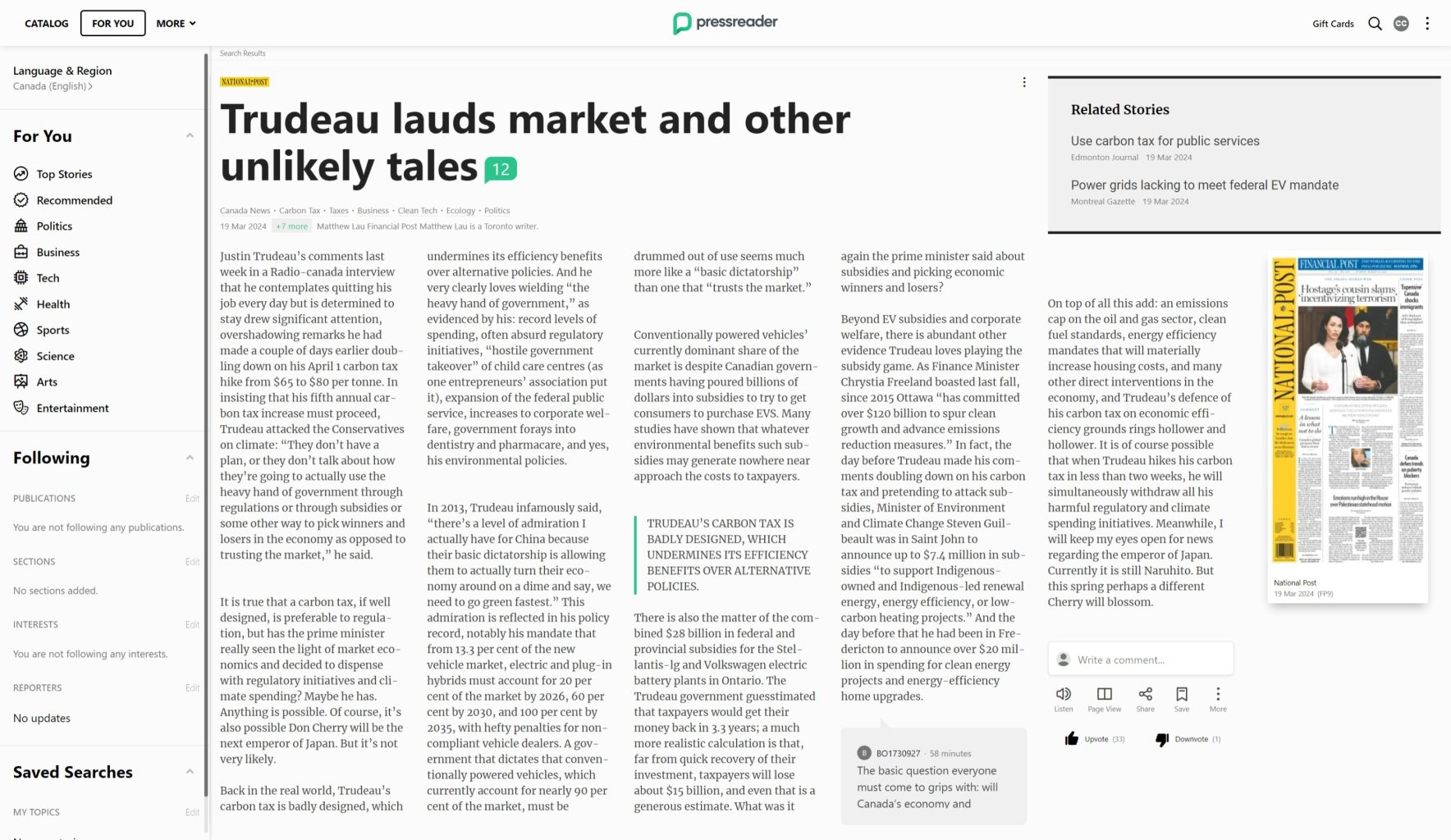April Fools’ Carbon Tax Surge: Navigating Political Fumes Amid CO2e Hike
Canada’s Climate Challenge:
Exploring the Rationale Behind the CO2e Surge
Canada’s carbon tax policy has been a subject of intense political debate, especially with the proposed increase to $85 per tonne of carbon dioxide equivalent (CO2e). This substantial hike is part of the government’s ambitious climate action plan to encourage a reduction in greenhouse gas emissions and transition towards a greener economy. The carbon tax, which was $50 per tonne in 2022, rose to $65 in 2023 and is set to reach $170 by 2030.
Economic Impact and Criticisms:
Assessing Concerns Amidst the Green Transition
The rationale behind this steep increase is to meet Canada’s environmental targets, including a 30% reduction in emissions by 2030 compared to 2005 levels. The government justifies the tax as a necessary measure to shift consumer and business behavior away from fossil fuels and towards cleaner energy sources. The revenue generated from the carbon tax is redistributed back to households through the Climate Action Incentive payments, ensuring that most families receive more in rebates than they pay in taxes.
However, the policy has faced criticism for its potential economic impact. Some analyses suggest that the tax could lead to a decline in Gross Domestic Product (GDP) and job losses, although these findings are contested by other experts who argue that the carbon tax will have minimal effect on the overall economy. The increase in energy costs is also a concern, particularly for lower-income households, despite the government’s rebates and spending intended to offset these expenses.
The Carbon Tax and Rebate System:
A Strategic Approach to Behavioral Change
The carbon tax is a key element of Canada’s strategy to fulfill its international climate commitments and is seen as a critical step towards achieving a net-zero carbon economy by 2050. As the policy evolves, it continues to be a focal point for discussions on balancing environmental responsibility with economic stability.
Table summarizing the Canada Carbon Rebate amounts for the year 2024-25, which reflects the tax collection details:
| Province/Territory | First Adult | Second Adult | Each Child | Family of 4 | Rural Top-Up |
|---|---|---|---|---|---|
| Alberta (AB) | $900 | $450 | $225 | $1,800 | 20% |
| Manitoba (MB) | $600 | $300 | $150 | $1,200 | 20% |
| Ontario (ON) | $560 | $280 | $140 | $1,120 | 20% |
| Saskatchewan (SK) | $752 | $376 | $188 | $1,504 | 20% |
| New Brunswick (NB) | $380 | $190 | $95 | $760 | 20% |
| Nova Scotia (NS) | $412 | $206 | $103 | $824 | 20% |
| Prince Edward Island (PEI) | $440 | $220 | $110 | $880 | Included |
| Newfoundland and Labrador (NL) | $596 | $298 | $149 | $1,192 | 20% |
These amounts are based on the quarterly Canada Carbon Rebate payments for a family of four in the provinces where the federal fuel charge applies. Residents in rural communities receive a 20% top-up to the base rebate amount in recognition of their higher energy needs and more limited access to cleaner transportation options.
Premiers’ Perspectives vs. Expert Insights:
Deconstructing Views on Economic Stability and Environmental Responsibility
Premiers across Canada have expressed concerns about the federal carbon tax increase. Here’s a summary of their statements and an analysis of expert opinions:
Premiers’ Statements
Premier Danielle Smith of Alberta emphasized her concerns over the federal carbon tax program, suggesting it could have negative implications for the province’s economy.
Premiers across Canada have expressed concerns about the federal carbon tax increase. Here’s a summary of their statements and an analysis of expert opinions:
- Premier Danielle Smith of Alberta emphasized her concerns over the federal carbon tax program, suggesting it could have negative implications for the province’s economy.
- Premier Andrew Furey of Newfoundland and Labrador wrote to Prime Minister Justin Trudeau asking him not to raise the tax, citing the financial strain on families and asking for federal collaboration to address current challenges.
- Premier Doug Ford of Ontario, along with other premiers, has called for the federal government to reconsider the tax hike, arguing that it could exacerbate the cost of living and put Canadian jobs at risk.
Expert Opinions:
Hadrian Mertins-Kirkwood, a senior researcher with the Canadian Centre for Policy Alternatives, mentioned that while the carbon tax increase is incremental, it is not expected to have a huge impact on gas expenses for individuals or be a major expense for businesses. He also noted that oil market fluctuations and gas taxes have a much bigger impact on energy costs.
- Hadrian Mertins-Kirkwood, a senior researcher with the Canadian Centre for Policy Alternatives, mentioned that while the carbon tax increase is incremental, it is not expected to have a huge impact on gas expenses for individuals or be a major expense for businesses. He also noted that oil market fluctuations and gas taxes have a much bigger impact on energy costs.
- Trevor Tombe, an economist at the University of Calgary, pointed out that the carbon tax’s impact on consumer costs, including food prices, is less than one percent, with the Bank of Canada estimating that the carbon tax increases inflation by only 0.15 per cent.
Analysis: The premiers’ opposition seems to stem from concerns about the immediate economic impact on households and businesses, particularly in the context of rising living costs. They argue that the tax hike could deepen the financial burden on families and reduce the competitiveness of Canadian businesses.
On the other hand, experts suggest that the actual impact of the carbon tax on individual expenses and the broader economy may be relatively small. They highlight that the carbon tax is part of a long-term strategy to combat climate change and that the rebates are designed to offset the increased costs for most households.
The debate reflects a tension between short-term economic pressures and long-term environmental goals. While the premiers focus on the immediate financial implications, experts emphasize the importance of the carbon tax in driving the transition to a greener economy and its minimal impact on inflation and consumer prices in the grand scheme of things. The effectiveness of the carbon tax and rebate system will likely continue to be a topic of discussion as Canada moves forward with its climate action plan.
Here’s a breakdown of the system’s efficiency:
- Behavioural Incentive: By imposing a tax on carbon emissions, the government sets a clear price signal that encourages individuals and businesses to reduce their use of fossil fuels. Those who use less fuel pay less tax.
- Revenue Recycling: The revenue generated from the carbon tax is not kept by the government but is instead returned to the citizens through rebates. This process is known as revenue recycling and is intended to offset the additional costs incurred by consumers due to the carbon tax.
- Progressivity: The rebate system is designed to be progressive, meaning that it benefits lower-income households the most. Statistics show that the majority of households, especially those with lower incomes, receive rebates that exceed their carbon-tax costs. This is important because carbon taxes can be regressive, disproportionately affecting those with lower incomes.
- Economic Efficiency: The rebate system aims to maintain economic efficiency by returning the tax revenue to the economy, thus avoiding a negative impact on overall economic activity. It also helps to counter the regressive nature of carbon taxes by ensuring that those with lower incomes are not disproportionately affected.
- Rural Consideration: Recognizing that rural residents have higher energy needs and more limited access to cleaner transportation options, the government proposes to increase the top-up for rural residents, ensuring that the carbon pricing system remains equitable.
In summary, the carbon tax and rebate system is designed to reduce emissions by making carbon-intensive activities more expensive while ensuring that the tax does not lead to financial hardship for households. The rebates help to maintain the purchasing power of individuals and support the transition to a greener economy. The system’s effectiveness lies in its ability to balance environmental objectives with social and economic considerations.
愚人節的碳稅激增:在二氧化碳當量上漲中駕馭政治煙霧
加拿大的氣候挑戰:
探索 CO2e 激增背後的基本原理
加拿大的碳稅政策一直是激烈政治辯論的主題,特別是提議將每噸二氧化碳當量 (CO2e) 提高到 85 加元。此次大幅加息是政府雄心勃勃的氣候行動計劃的一部分,該計劃旨在鼓勵減少溫室氣體排放和向綠色經濟過渡。 2022 年的碳稅為每噸 50 美元,2023 年升至 65 美元,到 2030 年將達到 170 美元。
經濟影響和批評:
評估綠色轉型中的擔憂
這一急劇增長背後的基本原理是實現加拿大的環境目標,包括到 2030 年將排放量比 2005 年的水準減少 30%。 政府認為,稅收是將消費者和商業行為從化石燃料轉向清潔能源的必要措施。 碳稅產生的收入通過氣候行動激勵金重新分配給家庭,確保大多數家庭獲得的退稅多於他們繳納的稅款。
然而,該政策因其潛在的經濟影響而受到批評。 一些分析表明,碳稅可能導致國內生產總值(GDP)下降和失業,儘管這些發現受到其他專家的質疑,他們認為碳稅對整體經濟的影響微乎其微。 能源成本的增加也是一個令人擔憂的問題,特別是對低收入家庭而言,儘管政府提供了旨在抵消這些費用的回扣和支出。
碳稅和退稅制度:
行為改變的戰略方法
碳稅是加拿大履行其國際氣候承諾戰略的關鍵要素,被視為到 2050 年實現凈零碳經濟的關鍵一步。隨著政策的發展,它仍然是平衡環境責任與經濟穩定的討論的焦點。
表格總結了 2024-25 年度加拿大碳退稅金額,其中反映了稅收詳情:
| Province/Territory | First Adult | Second Adult | Each Child | Family of 4 | Rural Top-Up |
|---|---|---|---|---|---|
| Alberta (AB) | $900 | $450 | $225 | $1,800 | 20% |
| Manitoba (MB) | $600 | $300 | $150 | $1,200 | 20% |
| Ontario (ON) | $560 | $280 | $140 | $1,120 | 20% |
| Saskatchewan (SK) | $752 | $376 | $188 | $1,504 | 20% |
| New Brunswick (NB) | $380 | $190 | $95 | $760 | 20% |
| Nova Scotia (NS) | $412 | $206 | $103 | $824 | 20% |
| Prince Edward Island (PEI) | $440 | $220 | $110 | $880 | Included |
| Newfoundland and Labrador (NL) | $596 | $298 | $149 | $1,192 | 20% |
這些金額基於在適用聯邦燃料費的省份為一個四口之家支付的季度加拿大碳回扣。 農村社區的居民將獲得基本退稅金額的 20% 補充,以表彰他們更高的能源需求和更有限的清潔交通選擇。
總理的觀點與專家的見解:
解構經濟穩定與環境責任觀
加拿大各地的總理都對聯邦碳稅的增加表示擔憂。以下是他們的陳述摘要和對專家意見的分析:
總理致辭
阿爾伯塔省省長丹妮爾·史密斯(Danielle Smith)強調了她對聯邦碳稅計劃的擔憂,認為這可能會對該省的經濟產生負面影響。
加拿大各地的總理都對聯邦碳稅的增加表示擔憂。以下是他們的陳述摘要和對專家意見的分析:
- 阿爾伯塔省省長丹妮爾·史密斯(Danielle Smith)強調了她對聯邦碳稅計劃的擔憂,認為這可能會對該省的經濟產生負面影響。
- 紐芬蘭和拉布拉多省省長安德魯·弗瑞(Andrew Furey)寫信給總理賈斯汀·特魯多(Justin Trudeau),要求他不要提高稅收,理由是家庭面臨財務壓力,並要求聯邦政府合作應對當前的挑戰。
- 安大略省省長道格·福特(Doug Ford)和其他省長呼籲聯邦政府重新考慮加稅,認為這可能會加劇生活成本並使加拿大的就業面臨風險。
專家意見:
加拿大政策選擇中心高級研究員哈德良·默廷斯-柯克伍德(Hadrian Mertins-Kirkwood)提到,雖然碳稅的增加是漸進式的,但預計不會對個人的天然氣支出產生巨大影響,也不會成為企業的主要支出。他還指出,石油市場波動和天然氣稅對能源成本的影響要大得多。
- 加拿大政策選擇中心高級研究員哈德良·默廷斯-柯克伍德(Hadrian Mertins-Kirkwood)提到,雖然碳稅的增加是漸進式的,但預計不會對個人的天然氣支出產生巨大影響,也不會成為企業的主要支出。 他還指出,石油市場波動和天然氣稅對能源成本的影響要大得多。
- 卡爾加里大學(University of Calgary)經濟學家特雷弗·湯姆貝(Trevor Tombe)指出,碳稅對包括食品價格在內的消費者成本的影響不到1%,加拿大央行估計,碳稅僅使通貨膨脹率上升0.15 %。
分析:總理們的反對似乎源於對家庭和企業的直接經濟影響的擔憂,尤其是在生活成本上升的背景下。他們認為,加稅可能會加深家庭的經濟負擔,並降低加拿大企業的競爭力。
另一方面,專家認為,碳稅對個人支出和整體經濟的實際影響可能相對較小。他們強調,碳稅是應對氣候變化的長期戰略的一部分,退稅旨在抵消大多數家庭增加的成本。
這場辯論反映了短期經濟壓力與長期環境目標之間的緊張關係。雖然總理們關注的是直接的財務影響,但專家們強調了碳稅在推動向綠色經濟轉型方面的重要性,以及碳稅在宏觀上對通貨膨脹和消費者價格的影響最小。隨著加拿大推進其氣候行動計劃,碳稅和退稅制度的有效性可能會繼續成為討論的話題。
以下是系統效率的細分:
- 行為激勵:通過對碳排放徵稅,政府設定了一個明確的價格信號,鼓勵個人和企業減少化石燃料的使用。那些使用較少燃料的人繳納的稅款較少。
- 收入回收:碳稅產生的收入不是由政府保留,而是通過回扣返還給公民。 這個過程被稱為收入回收,旨在抵消消費者因碳稅而產生的額外成本。
- 累進性: 退稅制度的設計是漸進的,這意味著它對低收入家庭的好處最大。 統計數據顯示,大多數家庭,尤其是低收入家庭,獲得的退稅超過了其碳稅成本。這很重要,因為碳稅可能是累退的,對低收入人群的影響尤為嚴重。
- 經濟效率: 退稅制度旨在通過將稅收返還給經濟來保持經濟效率,從而避免對整體經濟活動產生負面影響。 它還有助於通過確保低收入者不會受到不成比例的影響來應對碳稅的累退性質 。
- 農村考慮:認識到農村居民的能源需求更高,獲得更清潔的交通選擇的機會更有限,政府建議增加農村居民的充值,確保碳定價體系保持公平。
總之,碳稅和退稅制度旨在通過提高碳密集型活動的成本來減少排放,同時確保稅收不會導致家庭陷入經濟困難。退稅有助於維持個人的購買力,並支援向綠色經濟的過渡。該系統的有效性在於它能夠平衡環境目標與社會和經濟考慮。








